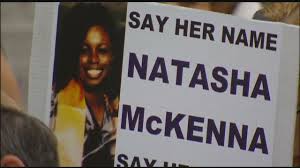
September 15 — For more than two hours last night, angry protesters criticized county officials about the death of Natasha McKenna, a 37 year-old woman diagnosed with schizophrenia who died earlier this year after being stunned with a taser four times in the Fairfax County detention center.
Frequently breaking into chants of “Black Lives Matter” and McKenna’s last words – “You Promised You Wouldn’t Kill Me” – the protesters aired their complaints during a public meeting of the Ad Hoc Police Practices Review Commission which has no jurisdiction of the Fairfax County Sheriff’s Office, which runs the jail, but was created to review police interactions with the public.
This was the second public forum held by the commission and by far the best attended and most emotional. Several times, protesters shouted at the commission. The protesters accused the sheriff’s office of murdering McKenna and condemned Commonwealth Attorney Raymond F. Morrogh for labeling McKenna’s death an “accident” and blaming it on “excited delirium,” a conclusion reached by the state Medical Examiner’s Office two days after McKenna’s death.
Although the commission had nothing to do with Morrogh’s report, its members came under fire for not publicly calling for Morrogh’s resignation and for not having more minority members as commissioners.
Speaking on behalf of the National Alliance on Mental Illness, Bob Carolla described a frightening encounter that he had with the police during his first psychotic break and explained that persons with mental illness often have trouble following police orders when they are not thinking clearly. Carolla asked why the INOVA health care system was not being questioned about its handling of McKenna who went to several INOVA emergency rooms seeking help before she was arrested.
Before the raucous public hearing, the commission’s subcommittee on Use of Force by the Fairfax County Police issued its 76 page report that included 40 specific recommendations.
Among them were:
*Expanding the number of Mobile Mental Health Crisis Response Units from one to a total of four units and making them available for calls 24 hours per day. The report noted that the police are asked to respond to between 5,000 to 7,000 mental health calls a year.
*Prohibit the use of an ECW (Taser) on a handcuffed, or otherwise restrained individual, who is actively resisting, unless an objective reasonable officer concludes that the resistance could result in serious injury to him or herself or others and less severe force alternatives have been ineffective or are deemed unacceptable for the situation.
*Forbid the use of an ECW more than three times on any individual. (McKenna was stunned four times while restrained.)
*Discontinue use of the term “excited delirium,” and replace it with a more medically and physiologically descriptive term.
McKenna’s death was ruled an accident caused by “excited delirium” by Dr. Jocelyn Posthumus, a state medical examiner even though that diagnosis is not recognized as real by the American Psychiatric Association, American Medical Association or the International Classification of Diseases of the World Health Organization and is most frequently cited in deaths that happened when persons are in custody.
Protesters at last night’s meeting lambasted Morrogh’s citing of excited delirium and the language that he used in his investigative report about McKenna to support that diagnosis. He described her as exhibiting superhuman strength, grunting like an animal and appearing to be demonically possessed — terms protesters said dehumanized, denigrated and marginalized her in an obvious attempt to blame her for her own death.
Last month, the commission issued a report by its mental health subcommittee that strongly urged the County Board of Supervisors to implement Crisis Intervention Team training in both the police department and sheriff’s office based on the so-called Memphis Model. Both the police chief and sheriff immediately agreed to that recommendation.
The mental health subcommittee also recommended the creation of a jail diversion program and the chief, sheriff and Chairman Sharon Bulova immediately worked with mental health officials to launch a Diversion First committee which will hold its second meeting tonight.



